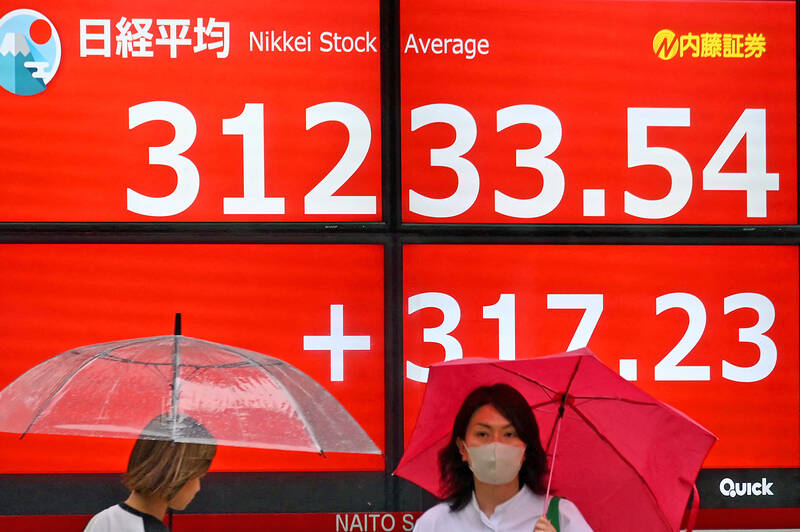Japan’s Nikkei 225 yesterday rose to its highest level since July 1990, buoyed by optimism over a US debt ceiling deal and a weaker yen.
However, a gauge of Chinese shares traded in Hong Kong inched closer to a bear market as a wobbling economic recovery, intensifying geopolitical tensions and a weaker yuan kept investors away.
In Tokyo trading, Softbank Group Corp jumped more than 8 percent as shares of Japanese chip-related companies continued to outperform amid the artificial intelligence (AI) euphoria that also propelled Wall Street peers.

Photo: AFP
The Nikkei surged as high as 31,560.43 within the first 10 minutes of trading, although gains were capped over the course of the day as the index closed up 1.03 percent at 31,233.54.
Softbank Group continued to push higher throughout the day, driven by news that British subsidiary Arm Ltd had rolled out a new chip technology that Taiwanese chipmaker MediaTek Inc (聯發科) would adopt in its next-generation products.
Shares of Advantest Corp, the chip-testing equipment maker that counts Nvidia Corp among its clients, climbed more than 4 percent, taking gains over the past three sessions to nearly 26 percent.
“The trigger for everything was Nvidia,” Sumitomo Mitsui DS Asset Management Co chief market strategist Masahiro Ichikawa said.
The Nikkei is easily swayed by moves in big tech stocks, relative to the broader TOPIX, which finished the day up 0.69 percent at 2,160.65.
Lifting the mood across the Japanese market early on, US President Joe Biden on Sunday said that he had finalized a budget agreement with US House of Representatives Speaker Kevin McCarthy and the deal was ready to move to the US Congress for a vote.
The MSCI Asia Pacific Index of regional stocks also climbed as sentiment improved on the US debt ceiling deal, but the Hang Seng China Enterprises Index (HSCEI) slumped as much as 1.3 percent, taking its losses from a Jan. 27 peak to more than 19 percent.
Meituan (美團) was the biggest drag amid concerns that increased competition would dent the e-commerce firm’s profitability.
The grim milestone is approaching as China’s post-COVID recovery loses momentum and earnings fall short of high expectations. Investors say the market lacks catalysts for a rebound as frictions with the US on issues from technology to Taiwan keep sentiment in check.
The HSCEI has erased about half of the gains seen during a three-month reopening rally through January. Down more than 6 percent this year, it is among the worst performers in Asia.
China’s onshore CSI 300 Index fell as much as 0.8 percent, after having erased all of its gains for this year last week amid a weaker yuan and developers’ debt woes.
Meituan shares tumbled as much as 8.4 percent to their lowest level since October last year. That more than offset a rally in NetEase Inc (網易) and Baidu Inc (百度) shares, and caused the Hang Sang Tech Index to reverse an early advance.
“Investors will only return in a meaningful way when concerns about geopolitics and broader economic recovery are allayed,” Union Bancaire Privee senior analyst Ling Vey-sern (凌煒森) said.

The US dollar was trading at NT$29.7 at 10am today on the Taipei Foreign Exchange, as the New Taiwan dollar gained NT$1.364 from the previous close last week. The NT dollar continued to rise today, after surging 3.07 percent on Friday. After opening at NT$30.91, the NT dollar gained more than NT$1 in just 15 minutes, briefly passing the NT$30 mark. Before the US Department of the Treasury's semi-annual currency report came out, expectations that the NT dollar would keep rising were already building. The NT dollar on Friday closed at NT$31.064, up by NT$0.953 — a 3.07 percent single-day gain. Today,

‘SHORT TERM’: The local currency would likely remain strong in the near term, driven by anticipated US trade pressure, capital inflows and expectations of a US Fed rate cut The US dollar is expected to fall below NT$30 in the near term, as traders anticipate increased pressure from Washington for Taiwan to allow the New Taiwan dollar to appreciate, Cathay United Bank (國泰世華銀行) chief economist Lin Chi-chao (林啟超) said. Following a sharp drop in the greenback against the NT dollar on Friday, Lin told the Central News Agency that the local currency is likely to remain strong in the short term, driven in part by market psychology surrounding anticipated US policy pressure. On Friday, the US dollar fell NT$0.953, or 3.07 percent, closing at NT$31.064 — its lowest level since Jan.

Hong Kong authorities ramped up sales of the local dollar as the greenback’s slide threatened the foreign-exchange peg. The Hong Kong Monetary Authority (HKMA) sold a record HK$60.5 billion (US$7.8 billion) of the city’s currency, according to an alert sent on its Bloomberg page yesterday in Asia, after it tested the upper end of its trading band. That added to the HK$56.1 billion of sales versus the greenback since Friday. The rapid intervention signals efforts from the city’s authorities to limit the local currency’s moves within its HK$7.75 to HK$7.85 per US dollar trading band. Heavy sales of the local dollar by

The Financial Supervisory Commission (FSC) yesterday met with some of the nation’s largest insurance companies as a skyrocketing New Taiwan dollar piles pressure on their hundreds of billions of dollars in US bond investments. The commission has asked some life insurance firms, among the biggest Asian holders of US debt, to discuss how the rapidly strengthening NT dollar has impacted their operations, people familiar with the matter said. The meeting took place as the NT dollar jumped as much as 5 percent yesterday, its biggest intraday gain in more than three decades. The local currency surged as exporters rushed to